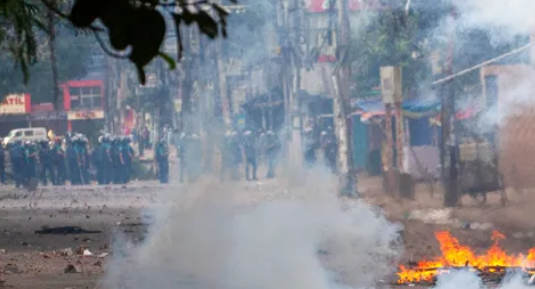Bangladesh on Friday declared a nationwide curfew and deployed the army to maintain order, after days of deadly protests against a quota system that gives relatives of war veterans a 30 percent share of government jobs.
The announcement was made by the secretary general of the ruling Awami League, Obaidul Quader, after police and security officials opened fire on protesters on Friday, killing several people, according to media reports, while authorities banned all gatherings in the capital.
Deadly clashes, deaths
Abdul Quader said the army had been deployed to help the civil administration maintain order.
Earlier on Friday, security forces fired live bullets and tear gas at protesters in Bangladesh, amid internet and mobile phone services being cut off after days of deadly clashes over government job allocations.
The protests, which began weeks ago and escalated on Monday, represent the biggest challenge to Prime Minister Sheikh Hasina since she won a fourth term in office in January elections boycotted by the main opposition parties.
Internet services disrupted
The fresh clashes follow the bloodiest day of protests so far, with local media reporting 22 people were killed when student protesters tried to impose a “complete lockdown” on the country. The Somoy TR channel reported four more deaths on Friday, though the death toll has not been confirmed.
The Associated Press reported that border guards opened fire on a crowd of more than 1,000 protesters who had gathered outside the main office of state-run Bangladesh Television, which was attacked and set ablaze by protesters the day before.
In the meantime, internet and mobile phone services were disrupted in the capital, Dhaka, and social media platforms such as Facebook and WhatsApp were not working.
The telecom regulator said in a statement that it was unable to guarantee service after its data centre was attacked on Thursday by protesters who set fire to equipment.
The protesters are demanding an end to a quota system that allocates up to 30 percent of government jobs to relatives of veterans who fought in Bangladesh’s 1971 independence war against Pakistan.
They say the system is discriminatory and benefits supporters of Prime Minister Sheikh Hasina, whose Awami League party led the independence movement, and want it replaced with a merit-based system.
But Hasina has defended the quota system, saying veterans deserve the highest respect for their contributions to the war regardless of their political affiliations.

